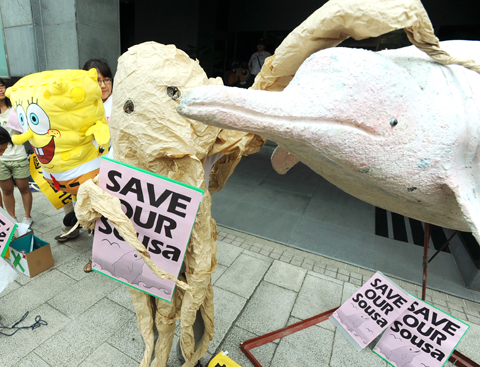Criticized by environmentalists over recent remarks that dolphins would make a detour to avoid a planned petrochemical plant in the coastal wetlands of Changhwa County, Premier Wu Den-yih (吳敦義) yesterday said the matter deserved more discussion.
“It is an interesting issue and deserves careful study,” Wu told reporters.
The premier said his remarks were derived from Chou Lien-siang (周蓮香), a professor at the Institute of Ecology and Evolutionary Biology at National Taiwan University, and Chen Bao-lang (陳寶郎), chairman of Kuokuang Petrochemical Technology Company Ltd (KTPC), which is behind the plant proposal.

PHOTO: WANG YI-SUNG, TAIPEI TIMES
“They are both dolphin experts. You can go ahead and ask them,” Wu said.
Wu made the controversial remarks on Wednesday last week when asked to respond to concerns over the impact of the plant on the endangered dolphins.
“Dolphins know how to make a detour in the waterfront at Taichung harbor, why can’t they do the same in Changhwa?” he asked.
Environmental groups responded in anger, but Wu on Saturday remained intransigent, saying: “It is well known that dolphins know how to detour when necessary. If not, dolphins kept in ocean parks would often run into the walls of the pool they’re kept in.”
Describing dolphins as a kind of “fish,” Wu said it would be very simple to “catch them.”
“If fish couldn’t turn, you wouldn’t need satellite systems to detect their location and you could catch as many as you want, as long as you put fishing nets in front of them,” Wu said.
KPTC, a subsidiary of CPC, Taiwan Corp (台灣中油), intends to build refineries on coastal wetlands in Dacheng Township (大城), Changhua County, near the mouth of the Jhuoshuei River (濁水溪).
To save the wetlands, environmentalists and oyster farmers have launched a campaign to raise an environmental trust fund to purchase them. While admitting he was not a dolphin expert, Wu said he agreed with Chou and Chen.
Chou, who was commissioned by KTPC to assess the impact of the oil refinery on the environment, said in her report that the Sixth Naphtha Cracking Plant in the coastal zone in Yunlin County did not stop dolphins from swimming northward and swimming back, while skirting the plant in the process.
Wu yesterday said the Environmental Protection Administration (EPA) initially said KTPC should build a corridor in the area to provide the dolphins with a migratory path to swim north and south, but Chen opposed the plan, saying it would cost NT$30 billion (US$932.5 million).
At a June 9 meeting held by the EPA to discuss the impact of the project on dolphins, Chen said: “Dolphins are as smart as I am. If there were something blocking the road on my way to a restaurant, I would find a detour.”

The High Prosecutors’ Office yesterday withdrew an appeal against the acquittal of a former bank manager 22 years after his death, marking Taiwan’s first instance of prosecutors rendering posthumous justice to a wrongfully convicted defendant. Chu Ching-en (諸慶恩) — formerly a manager at the Taipei branch of BNP Paribas — was in 1999 accused by Weng Mao-chung (翁茂鍾), then-president of Chia Her Industrial Co, of forging a request for a fixed deposit of US$10 million by I-Hwa Industrial Co, a subsidiary of Chia Her, which was used as collateral. Chu was ruled not guilty in the first trial, but was found guilty

DEADLOCK: As the commission is unable to forum a quorum to review license renewal applications, the channel operators are not at fault and can air past their license date The National Communications Commission (NCC) yesterday said that the Public Television Service (PTS) and 36 other television and radio broadcasters could continue airing, despite the commission’s inability to meet a quorum to review their license renewal applications. The licenses of PTS and the other channels are set to expire between this month and June. The National Communications Commission Organization Act (國家通訊傳播委員會組織法) stipulates that the commission must meet the mandated quorum of four to hold a valid meeting. The seven-member commission currently has only three commissioners. “We have informed the channel operators of the progress we have made in reviewing their license renewal applications, and

‘DENIAL DEFENSE’: The US would increase its military presence with uncrewed ships, and submarines, while boosting defense in the Indo-Pacific, a Pete Hegseth memo said The US is reorienting its military strategy to focus primarily on deterring a potential Chinese invasion of Taiwan, a memo signed by US Secretary of Defense Pete Hegseth showed. The memo also called on Taiwan to increase its defense spending. The document, known as the “Interim National Defense Strategic Guidance,” was distributed this month and detailed the national defense plans of US President Donald Trump’s administration, an article in the Washington Post said on Saturday. It outlines how the US can prepare for a potential war with China and defend itself from threats in the “near abroad,” including Greenland and the Panama

A wild live dugong was found in Taiwan for the first time in 88 years, after it was accidentally caught by a fisher’s net on Tuesday in Yilan County’s Fenniaolin (粉鳥林). This is the first sighting of the species in Taiwan since 1937, having already been considered “extinct” in the country and considered as “vulnerable” by the International Union for Conservation of Nature. A fisher surnamed Chen (陳) went to Fenniaolin to collect the fish in his netting, but instead caught a 3m long, 500kg dugong. The fisher released the animal back into the wild, not realizing it was an endangered species at